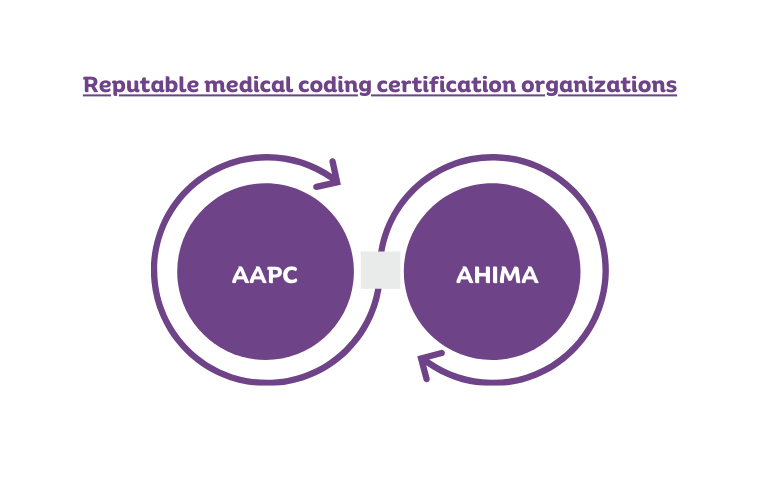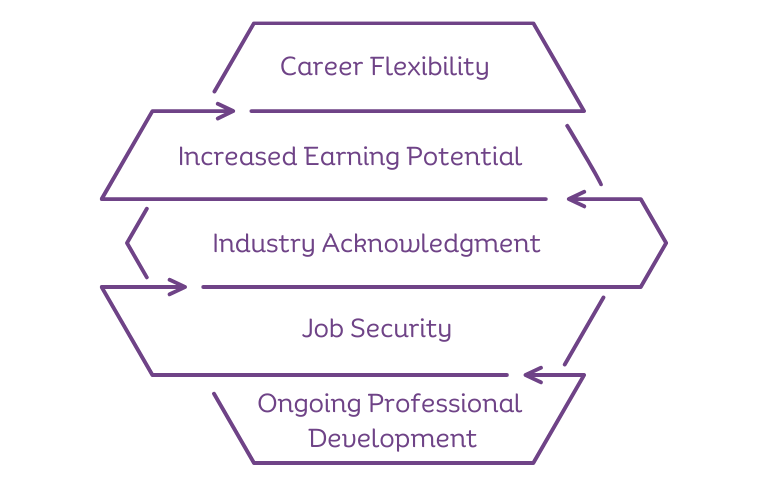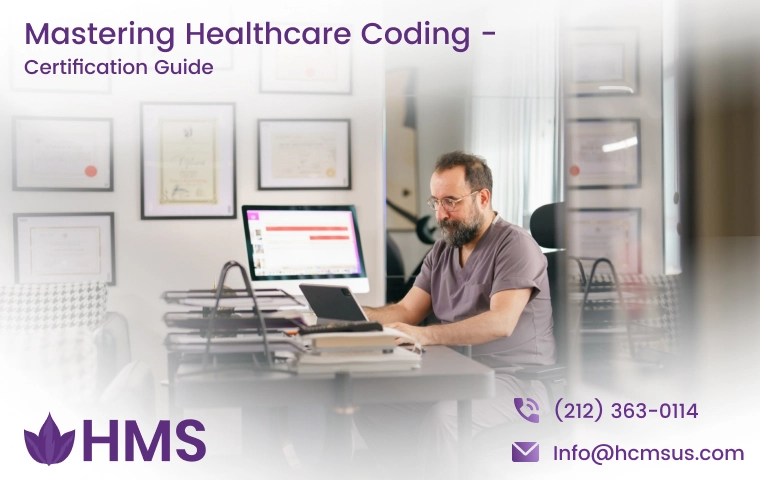Within the realm of healthcare administration, precision is paramount, and certified medical coders play a pivotal role in maintaining accurate healthcare records. This guide sheds light on the crucial aspects of medical coding certification, offering insights into the prerequisites such as educational background, specialized training, and practical experience necessary for success in this field.
Learn about certifications from organizations such as the American Academy of Professional Coders (AAPC), and the American Health Information Management Association (AHIMA). This guide aims to provide foundational knowledge for aspiring professionals looking to pursue a career in medical coding.
It also touches on the various opportunities for career growth within the dynamic healthcare landscape, emphasizing the importance of these certifications in maintaining precision and accuracy in healthcare documentation.
What is Medical Coding Certification?
Medical coding certification is a recognized credential that validates an individual's proficiency in translating complex healthcare services and procedures into standardized codes. These codes are essential for billing, medical records, and statistical analysis, ensuring a consistent and accurate flow of information within the healthcare system.
Accurate Translation: Certification ensures the coder can accurately translate diverse medical records into universally understood codes.
Billing Compliance: Certified coders play a vital role in ensuring billing accuracy and compliance with industry standards.
Data Standardization: The use of standardized codes facilitates efficient medical recordkeeping and data analysis.
Earning this certification typically involves meeting educational requirements, undergoing specialized training, and gaining practical experience in medical coding. It serves as a mark of excellence, signifying the coder's capability to navigate the intricate landscape of healthcare documentation with precision and adherence to industry standards.
Educational Requirements for Medical Coding Certification
To pursue medical coding certification, certain educational requirements must be met to ensure a comprehensive understanding of the field. Typically, candidates are expected to have a high school diploma or equivalent.
Additionally, completion of medical billing and coding training or education within a specified timeframe or relevant work experience within the field is a common prerequisite.
-
High school diploma or equivalent
-
Completion of medical billing and coding training or relevant work experience
-
Possession of code books (e.g., CPT, ICD-10-CM, HCPCS)
Meeting these educational criteria ensures that candidates entering the medical coding certification process possess the foundational knowledge and skills needed for success in the field.
Where Can You Obtain Medical Coding Certifications?
In the pursuit of medical coding certifications, two prominent organizations stand out, providing distinguished medical coding certification programs to validate coding expertise:

-
AAPC
-
AHIMA
AAPC Medical Coding Certification
The American Academy of Professional Coders (AAPC) provides recognized certifications, including the Certified Professional Coder (CPC). Focused on outpatient coding, AAPC certifications are highly regarded in the healthcare industry, offering specialized training and assessment.
AHIMA Medical Coding Certification
The American Health Information Management Association (AHIMA) is another reputable organization that offers medical coding certifications, such as the Certified Coding Specialist (CCS). AHIMA certifications cover a broad range of coding skills, encompassing both inpatient and outpatient settings. Gaining certification from AHIMA signifies a commitment to excellence in healthcare coding practices.
APC's Certified Professional Coder (CPC) focuses on outpatient coding, while AHIMA's Certified Coding Specialist (CCS) covers both inpatient and outpatient settings. These respected certifications indicate a dedication to excellence in healthcare coding practices through specialized training.
What is the Board of Medical Coding Certification?
The Board of Medical Coding Certification is a pivotal entity providing specialty medical coding certification, education, and training for professionals in the healthcare industry. This board, specifically the Board of Medical Specialty Coding and Compliance (BMSC), is dedicated to facilitating career advancement for medical coders, clinicians, and compliance professionals through comprehensive education initiatives.
Specialty Coding Professional (SCP):
For individuals holding the Specialty Coding Professional (SCP) certification, BMSC mandates an annual completion of 20 Continuing Education Units (CEUs). To ensure the continued validity of the certification, professionals must submit their Application for Recertification, including the necessary documentation and a payment of $149.00, by the anniversary of their certification.
Advanced Coding Specialist (ACS):
Professionals with the Advanced Coding Specialist (ACS) certification are required to complete 20 CEUs each year. The recertification process involves submitting the Application for Recertification, along with the essential documentation and a payment of $229.00, on or before the certification anniversary.
Certified Compliance Professional – Physician (CCP-P):
Maintaining the Certified Compliance Professional–Physician (CCP-P) certification involves completing 20 CEUs annually. Recertification requires the submission of the Application for Recertification, along with necessary documentation and a payment of $149.00, before the certification anniversary.BMSC serves as a vital entity for healthcare professionals, providing specialized certifications such as SCP, ACS, and CCP-P. The recertification process emphasizes continuous education and commitment to excellence. For added convenience, professionals can pursue their medical coding certification online through BMSC's accessible and comprehensive online education initiatives.
How Much Does a Medical Coding Certificate Cost?
The cost of a medical coding certification can vary, typically falling between $4,500 and $19,500. These programs provide comprehensive education, covering crucial aspects such as medical terminology and proficiency in CPT and ICD-10 coding systems.
Investing in a medical coding certification is a strategic move. Certified professionals often enjoy an annual salary boost of $6,000 on average compared to their non-certified counterparts, reflecting the significant career and financial advantages associated with obtaining this industry-recognized credential.
How Medical Coding Certification Shapes Your Career Landscape
Earning a medical coding certification significantly shapes and enhances your career landscape, opening doors to diverse opportunities within the healthcare industry. The certification not only validates your expertise but also positions you as a valuable asset to healthcare organizations.

-
Career Flexibility
-
Increased Earning Potential
-
Industry Acknowledgment
-
Job Security
-
Ongoing Professional Development
Securing a medical coding certification is not just a credential; it's a strategic career move that empowers you to navigate and excel in the dynamic world of healthcare.
Final Thoughts
Medical coding certification is essential for proficiency in healthcare documentation. This credential validates precision, showcasing a commitment to excellence in medical coding services. Aspiring professionals, armed with education, training, and experience, can embark on a fulfilling coding career.
The guide highlights AAPC and AHIMA certifications as roadmaps for success. Beyond the initial investment, the benefits include increased earnings, job security, and ongoing professional growth. Certified individuals become invaluable assets, contributing to accurate information flow and playing a vital role in delivering quality healthcare services.
FAQ! Need Help?
Medical coding certification validates the expertise of professionals in translating healthcare services into standardized codes, crucial for accurate billing and recordkeeping.
Online platforms like AAPC and AHIMA offer medical coding certification programs, allowing individuals to study and complete coursework remotely for convenient certification attainment.
The duration varies, but on average, it takes 6 to 12 months to obtain a medical coding certification, depending on the program and individual pace.
The best medical coding certification depends on career goals and preferences. AAPC's CPC is widely recognized for outpatient coding, while AHIMA's CCS covers both inpatient and outpatient settings.
Medical coding certification costs range from $4,500 to $19,500. The investment reflects the value of gaining expertise and the potential for increased earnings in the healthcare industry.
ABOUT AUTHOR

Jackson
As a blog writer with years of experience in the healthcare industry, I have got what it takes to write well researched content that adds value for the audience. I am a curious individual by nature, driven by passion and I translate that into my writings. I aspire to be among the leading content writers in the world.
